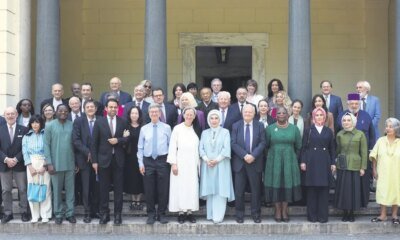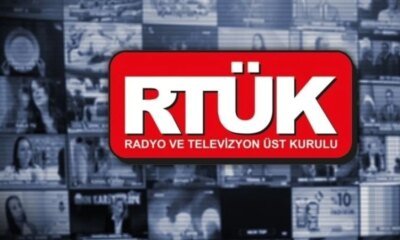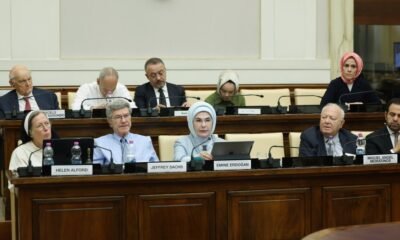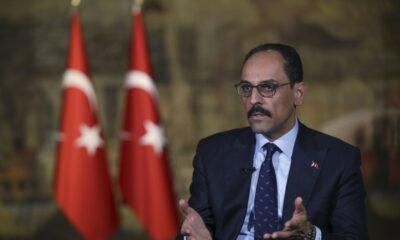Economy
Life after sanctions? Russian middle-class couple adapts easily
For middle-class couple Sergei Duzhikov and Maria Tyabut, living just outside Moscow, the Western sanctions imposed on Russia due to the war in Ukraine have been relatively easy to live with.
The pair drives a Chinese car, vacations in Venezuela and buys “Camembert” cheese made in Russia.
Their modest two-bedroom apartment in Mytishchi, home to 300,000 people northeast of the capital, has been recently renovated and their Chinese-made fridge is stocked with Russian goods.
Despite warnings of a looming recession and high inflation, they and many other Russians feel their economy has adapted successfully to Western sanctions, even if it means parting with some well-known Western brands for good.
“From the perspective of my everyday life – home, family, work, leisure, friends, hobbies and interests, I honestly don’t feel the impact of sanctions,” said Maria, who works at a cosmetics company.
“There aren’t any brands that have left such a void that I can’t live without them,” the 43-year-old added.
Supermarkets have found a range of domestic and foreign alternatives to Western products, including Camembert cheese, one of Maria’s creature comforts.
“It’s delicious. I haven’t tried real French Camembert, so I can’t compare,” she admitted.
“Overall, my life hasn’t changed much,” she told Agence France-Presse (AFP).
‘The kids love it’
Western countries first levied economic sanctions against Russia in 2014, after Moscow annexed Crimea from Ukraine.
Those sanctions became significantly tighter following Moscow’s full-scale assault on its neighbor.
Moscow responded by ramping up production of domestic goods, shifting its trade away from the West to what it calls “friendly” nations like China and importing other items through third countries.
For ordinary Russians, the most noticeable effect of this was an exodus of Western brands from supermarket shelves and from the high street.
Among the most well-known brands to leave was fast-food chain McDonald’s, famously replaced by Russian-owned “Vkusno i tochka” (which translates to “Delicious, Full Stop”) in 2022.
Maria’s husband Sergei, a funeral director, said he had “no complaints” about the quality of the food.
“The kids love it,” he said of the restaurant chain.
When shopping, Maria buys a new brand of yogurt that replaced one belonging to the French company Danone.
Danone left the Russian market in 2022 and eventually sold its operations to a businessman linked to Chechen leader Ramzan Kadyrov.
Some Russian companies have also been able to import popular Western goods via third countries, albeit at a higher cost.
As for vacations, Maria and Sergei have opted for trips across Russia and Latin America.
Most European countries cut off direct flights to Russia shortly after the offensive began, while some tightened entry requirements for Russian citizens.
The couple said they had been to Venezuela, a country under U.S. sanctions, which they described as a nation of “friendly people who love Russians.”
‘Little by little’
The couple admitted there were a few teething issues.
Two years ago, after a car accident, Sergei said he waited “three months” for spare parts to repair his Korean-made Kia because of sanctions.
“That’s when I realised that it probably made sense to sell my beloved Korean car and replace it with a similar Chinese one,” he told AFP.
Maria also said she noticed it was harder to find products in “certain” categories of goods.
But overall, she said, “I don’t feel deprived in any way. Certainly not when it comes to food. There’s a wide and rich selection.”
The Russian economy has been marked by volatility since Moscow launched its Ukraine offensive in 2022, a military assault that has resulted in tens of thousands of deaths.
The country reported strong economic expansion in 2023 and 2024, largely due to massive state defense spending on the conflict, but is now slowing down after a period of what officials called “overheating.”
Inflation has also been running high, clocking in at more than double the central bank’s target for over a year.
Maria and her husband’s combined income is around 300,000 rubles (around $3,800), higher than the average wage for one person of around 100,000.
While Maria acknowledged prices were going up, she said her family was not “crying” about it.
“It’s not like we used to buy a kilogram (35 ounces) of buckwheat three years ago, and now we can only afford 600 grams,” she said.
“They are rising little by little.”
Economy
China retaliates against EU, bars imports of medical devices
China announced on Sunday that European medical device companies will be barred from selling to the Chinese government as a countermeasure for the European Union’s restrictions on the sale of similar products from China.
European companies will be excluded if the budget for procurement is above 45 million yuan ($6.28 million), according to a notice from the Finance Ministry on Sunday, with the restrictions in place the same day. The move will not apply to European companies that have invested in China and that manufacture goods in the country.
China earlier on Friday imposed anti-dumping duties on European brandy, most notably cognac produced in France.
While the duties on brandy include several exceptions for major brandy producers, China and the EU have multiple trade disputes across a range of industries.
China protested after many European countries levied duties on EVs made in China. Since then, China has also launched investigations into European pork and dairy products.
In June, the EU announced that Chinese companies were to be excluded from any government purchases of more than 5 million euros ($5.89 million). The measure seeks to incentivise China to cease its discrimination against EU firms, the EU said, accusing China of erecting “significant and recurring legal and administrative barriers to its procurement market.”
In response, China has said it had “no choice but to implement countermeasures.”
“China has repeatedly expressed through bilateral dialogues that it is willing to properly handle differences with the EU through dialogue and consultation and bilateral government procurement arrangements,” said a statement from a spokesperson with the Ministry of Commerce.
“Unfortunately, the EU has ignored China’s goodwill and sincerity and still insisted on taking restrictive measures and building new protectionist barriers.”
Economy
Türkiye sets new record in agricultural output, enters world’s top 7
Türkiye’s agricultural output reached a record high, rising for the first time above $70 billion last year, according to Agriculture and Forestry Minister Ibrahim Yumaklı on Sunday. This, he said, placed the country among the top seven in the world.
“Our agricultural production, which was $68.9 billion in 2023, increased by 7% to $74 billion in 2024,” Yumaklı said on X.
“According to World Bank data, our agricultural output rose from $68.9 billion in 2023 to $74 billion in 2024, a 7% increase. With this, we’ve entered the top seven countries globally. For the first time, our country has surpassed the $70 billion mark,” he added.
The graph shared by the minister showed Türkiye moving one place up compared to a year earlier, and also climbing from 12th position back in 2022.
The leader in the output in 2024 remained China and was followed by India and the U.S., the graph revealed.
Yumaklı also congratulated those who contributed to the success, including producers and industrialists.
Economy
Trump prevails for now, but his big bill may come at political cost
Former U.S. Presidents Barack Obama and Joe Biden had signature pieces of legislation in the form of the Affordable Care Act and the Inflation Reduction Act. President Donald Trump will have the tax cuts.
All were hailed in the moment and became ripe political targets in campaigns that followed. In Trump’s case, the tax cuts may almost become lost in the debates over other parts of the multitrillion-dollar bill that Democrats say will force poor Americans off their health care and overturn a decade or more of energy policy.
Through persuasion and browbeating, Trump forced nearly all congressional Republicans to line up behind his marquee legislation despite some of its unpalatable pieces.
He followed the playbook that had marked his life in business before politics. He focused on branding – labeling the legislation the “One Big, Beautiful Bill” – then relentlessly pushed to strong-arm it through Congress, solely on the votes of Republicans.
Victory to be tested
But Trump’s victory will soon be tested during the 2026 midterm elections, where Democrats plan to run on a durable theme: that the Republican president favors the rich on tax cuts over poorer people who will lose their health care.
Trump and Republicans argue that those who deserve coverage will retain it. Nonpartisan analysts, however, project significant increases of the number of uninsured. Meanwhile, the GOP’s promise that the bill will turbocharge the economy will be tested at a time of uncertainty and trade turmoil.
Trump has tried to counter the notion of favoring the rich with provisions that would reduce taxes for people paid in tips and receiving overtime pay, two kinds of earners who represent a small share of the workforce.
Extending the tax cuts from Trump’s first term that were set to expire if Congress failed to act meant he could also argue that millions of people would avoid a tax increase. To enact that and other expensive priorities, Republicans made steep cuts to Medicaid that ultimately belied Trump’s promise that those on government entitlement programs “won’t be affected.”
“The biggest thing is, he’s answering the call of the forgotten people. That’s why his No. 1 request was the no tax on tips, the no tax on overtime, tax relief for seniors,” said Representative Jason Smith, chairperson of the tax-writing House Ways and Means Committee. “I think that’s going to be the big impact.”
Presidents have seen their signature legislative accomplishments unraveled by their successors or become a significant political liability for their party in subsequent elections.
A central case for Biden’s reelection was that the public would reward the Democrat for his legislative accomplishments. That never bore fruit as he struggled to improve his poll numbers, driven down by concerns about his age and stubborn inflation.
Since taking office in January, Trump has acted to gut tax breaks meant to boost clean energy initiatives that were part of Biden’s landmark health care and climate bill.
Obama’s health overhaul, which the Democrat signed into law in March 2010, led to a political bloodbath in the midterms that fall. Its popularity only became potent when Republicans tried to repeal it in 2017.
Whatever political boost Trump may have gotten from his first-term tax cuts in 2017 did not help him in the 2018 midterms, when Democrats regained control of the House, or in 2020 when he lost to Biden.
“I don’t think there’s much, if any, evidence from recent or even not-so-recent history of the president’s party passing a big one-party bill and getting rewarded for it,” said Kyle Kondik, an elections analyst with the nonpartisan University of Virginia’s Center for Politics.
Democrats hope they can translate their policy losses into political gains.
During an Oval Office appearance in January, Trump pledged he would “love and cherish Social Security, Medicare, Medicaid.”
“We’re not going to do anything with that, other than if we can find some abuse or waste, we’ll do something,” Trump said. “But the people won’t be affected. It will only be more effective and better.”
Medicaid, food assistance
That promise is far removed from what Trump and the Republican Party ultimately chose to do, paring back not only Medicaid but also food assistance for the poor to make the math work on their sweeping bill. It would force 11.8 million more people to become uninsured by 2034, according to the Congressional Budget Office, whose estimates the GOP has dismissed.
“In Trump’s first term, Democrats in Congress prevented bad outcomes. They didn’t repeal the (Affordable Care Act), and we did COVID-19 relief together. This time is different,” said Senator Brian Schatz. “Hospitals will close, people will die, the cost of electricity will go up, and people will go without food.”
Senator Thom Tillis repeatedly argued the legislation would lead to drastic coverage losses in his home state and others, leaving them vulnerable to political attacks similar to what Democrats faced after they enacted “Obamacare.” With his warnings unheeded, Tillis announced he would not run for reelection after he opposed advancing the bill and enduring Trump’s criticism.
“If there is a political dimension to this, it is the extraordinary impact that you’re going to have in states like California, blue states with red districts,” Tillis said. “The narrative is going to be overwhelmingly negative in states like California, New York, Illinois, and New Jersey.”
Even Senator Lisa Murkowski, who eventually became the decisive vote in the Senate that ensured the bill’s passage, said the legislation needed more work and she urged the House to revise it. Lawmakers there did not.
Early polling suggests that Trump’s bill is deeply unpopular, including among independents and a healthy share of Republicans. White House officials said their own research does not reflect that.
So far, it’s only Republicans celebrating the victory. That seems fine with the president.
In a speech in Iowa after the bill passed, he said Democrats only opposed it because they “hated Trump.” That didn’t bother him, he said, “because I hate them, too.”
Economy
Türkiye’s inflation falls to 35.1% in June, extends downward trend
Annual inflation in Türkiye eased further in June to nearly 35.1%, official data showed on Thursday, continuing a downward trend amid a period of disinflation lasting since the middle of last year.
The consumer price index (CPI) came in at 35.05% in June, slowing down from 35.41% in May, the data from the Turkish Statistical Institute (TurkStat) revealed. The monthly inflation rose 1.37%, down from 1.53% in May, TurkStat said.
This marked the 13th consecutive month of easing consumer inflation and the lowest level since late 2021, bolstering the expectations for the rate cut by the central bank later this month.
The central bank kept rates steady at 46% last month, after reversing the easing cycle that it pivoted at the end of last year.
Both rates came in slightly below market estimates, which saw annual inflation at around 35.2% and monthly at 1.45%.
The highest price rises in June on a yearly basis were seen in education with 73.33%, housing 65.54% and health care 38.7%, according to TurkStat data.
On the other hand, the lowest price hikes were in clothing and footwear with 14.47%, communications with 18.43%, and recreation and culture with 27.53%.
TurkStat said there were three main expenditure groups with the highest weight: food and non-alcoholic beverages with annual inflation of 30.2%, along with transportation with 27.72% and housing with 65.54%.
“The contributions of these main groups to the annual change were 7.60% for food and nonalcoholic beverages, 4.51% for transportation and 9.22% for housing,” it added.
The monthly increase in prices, similarly was also led by education with 4.48%, the data revealed. It was followed by the housing at 2.62% and transport at 2.38%.
Commenting on the data, Treasury and Finance Minister Mehmet Şimşek said that monthly inflation in June was 1.37% despite rising oil prices due to geopolitical tensions.
Oil prices fluctuated amid the escalation of conflict and attacks between Israel and Iran, rising considerably compared to previous months before settling again as tensions eased.
“In services, where inertia is high, annual inflation dropped to 50% after three years,” Şimşek said on X.
“Our determination in the disinflation process has become evident in both actual data and expectations,” he added.
‘Improving expectations’
In recent times, declining commodity prices and reduced volatility in financial markets improved inflation expectations, the minister further said, adding that “supportive demand conditions will contribute to the continued decline in inflation in the second half of the year.”
“Our citizens can rest assured; a noticeable slowdown in inflation has begun across various sectors, from food and durable consumer goods to education and transportation, and this trend will continue,” he added.
His view was echoed by Vice President Cevdet Yılmaz, who in a post on X reiterated the government’s expectation to see inflation in the 20s range by the end of the year.
“The main trend of inflation continues to decline, and with the improvement in expectations, the decrease in inflation has been ongoing uninterrupted for 13 months since June 2024,” Yılmaz wrote on X.
Moreover, he said that with monthly inflation at 1.37%, this rate has remained below 2% for two straight months, while annual inflation decreased by over 40 points compared to June last year.
The Turkish central bank kept the forecast for inflation to drop to 24% by the end of 2025 in its last quarterly inflation report, keeping the wider window range between 19% and 29%, respectively. It will convene for the rate-setting meeting on July 24.
“We are closely monitoring the potential impacts of geopolitical developments and increasing protectionism in global trade on the disinflation process, and we are conducting our analyses based on all possible scenarios,” Yılmaz noted.
“Thanks to the economic program we are implementing and our determined stance on reducing inflation, we aim to reach inflation in the 20s by the end of this year and single-digit inflation in the coming period, thereby ensuring lasting prosperity for our citizens,” he concluded.
Economy
Italian way: How Rome plans to tackle new NATO spending hike
Italy, along with other NATO members, has recently agreed to increase defense spending sharply over the next decade. However, the government of Prime Minister Giorgia Meloni is already working on ways to minimize any impact on its strained public finances.
Unlike Spain, which openly said it could not go much above the old NATO target of 2% of national output, at a summit last week, Italy toed the line imposed by U.S. President Donald Trump, committing to 5% by 2035 – at least on the surface.
Meloni, aware that opinion polls show raising defense spending is highly unpopular among Italians, sought to reassure them after the NATO summit.
“These are necessary expenses, but we are committed to not diverting even a single euro from the government’s other priorities,” she told reporters.
Italy’s defense spending amounted to just 1.5% of output in 2024, near the low end of the 32 NATO members.
The government this year met the previous 2% target by a raft of accounting changes, factoring in previously excluded items such as soldiers’ pensions and the coastguard.
But hitting the new goal will be far more difficult. On paper, it would require an increase in spending of more than 60 billion euros ($71 billion), a huge task for a country with the eurozone’s second-largest debt pile, at 135% of output.
The European Commission, which is also urging EU states to hike defense spending, has adopted a so-called “escape clause” from its fiscal rules to allow increases of 1.5% of gross domestic product (GDP) per year through 2028.
Italy, however, has less scope to use this clause because its deficit is already considered too high.
Civilian infrastructure
Italian officials said Meloni would double down on this year’s approach by including items already budgeted for that have at best a tenuous link to defense, hoping the tactic is accepted by NATO and the European Commission.
Italy, the eurozone’s third-largest economy, could prove a litmus test for other NATO countries that have also signed up to the 5% goal but face an uphill struggle to reach it.
Rome is considering civilian infrastructure such as ports, shipyards and even an ambitious, long-planned bridge connecting Sicily to the mainland, officials said.
Overall, Italy plans to invest 206 billion euros in upgrading its railways and an additional 162 billion euros in its roads and motorways, according to a parliamentary study based on government data. Many of these projects could now be classified as defense and security projects.
“A large part of planned infrastructure investments fall within the NATO parameters because they have dual-use applications,” Deputy Transport Minister Edoardo Rixi told Reuters.
In response to a Reuters request for comment, the EU Commission said it was for Italy to determine whether an infrastructure’s main purpose was military or civilian.
A NATO official said countries must have “a credible path” to achieve their defense spending pledges, and they will provide plans on how they will support increases in their defense investments each year.”
In promising remarks for Italy’s plans, he added: “We need civilian transportation networks that can support military mobility. As well as tanks, fighters and warships, we need roads, rail and ports.”
Italy has already identified necessary strategic infrastructure projects worth a massive 483 billion euros to be completed over the following years, meaning there is no shortage of potential schemes to be included.
Playing for time
The new NATO target includes a core component for defense spending, which must reach 3.5% of GDP by 2035, and a further element on broader security-related investments, worth 1.5%.
Upgrading ports in the northern cities of Trieste and Genoa, as well as a shipbuilding and maintenance hub in nearby La Spezia, would be eligible for meeting NATO criteria, Rixi said.
“If you need to build, repair and maintain military ships as well as transport troops and military equipment, you need to have adequate infrastructure to do so,” he said.
Time is also a key factor. With the center-left opposition arguing that defense spending will divert resources from the welfare state, Meloni wants to delay any increases until after the next election, due in 2027, officials said.
“The real challenge for Meloni is not the amount but the timing,” said Francesco Galietti, founder of Rome-based political risk think-tank Policy Sonar.
In 2027, Italy will also be able to utilize the EU’s fiscal leeway “escape clause fully, provided it achieves a deficit below 3% of GDP in 2026 as planned.
For this reason, Rome successfully lobbied NATO allies to avoid a minimum annual defense spending increase being imposed, an official with knowledge of the negotiations said, adding that Rome was also instrumental in delaying the 5% target year to 2035 from a previously planned 2032.
“The message is clear, Italy will do what it must to meet its NATO commitments, but it will do so in its own time,” Galietti said.
Economy
Rising US debt, dollar’s worst showing since 1973 stir concerns
The U.S. economy had a different start to the year. Halfway through, the impulsive policy of President Donald Trump is also not helping to preserve the so-called “mighty” status of the dollar, which has seen the worst performance in over five decades.
Since the return of Trump to the White House, uncertainty about Washington’s financial policy has caused notable concern as the U.S. debt pile continues to rise. Analysts, meanwhile, say the president’s “One Big Beautiful Bill” could add extra pressure to it in the upcoming decade.
Concerns over the health of the U.S. economy and growing debt have also been visible on financial markets as U.S. bond yields have climbed – an indication that investors are worried about the sustainability of the debt of the world’s top economy.
Those concerns have also affected the dollar, which, as the global reserve currency, has usually been seen as a safe haven currency. Foreigners have to purchase dollars if they want to buy U.S. bonds, which have also been seen as one of the safest assets in times of volatility.
However, the dollar lost more than 10% during the first half of the year – its worst performance since 1973. On Thursday, it remained close to this week’s 3.5-year lows, hours ahead of a key jobs report, and as a U.S.-Vietnam trade accord fanned expectations for other potential deals ahead of July 9 when U.S. tariffs take effect.
Quickly changing dynamics related to tariffs, uncertainty and unpredictability when it comes to the next moves of Trump have dented investors’ confidence in the world’s largest economy. Recent reports, in contrast, revealed growing interest in Europe.
Data from LSEG’s Lipper Funds show that more than $100 billion has flowed into European equity funds so far this year – up threefold from the same period last year – while outflows from the U.S. more than doubled to nearly $87 billion.
The euro, a common currency used in 20 EU countries, also strengthened compared to the greenback in the recent period.
A common explanation for the weakening of the dollar versus a basket of currencies is the impact of Trump’s tariffs on the U.S. economy in the long term, coupled with the expectations that it might no longer outperform other major economies.
Yields on U.S. bonds climbing?
The U.S. Treasury raises funds by issuing three types of debt instruments: short-term bills, medium-term notes and long-term bonds. They carry a face value but are sold at a discount, with that price helping determine the yield, or rate of return, for investors.
Higher yields indicate investors are demanding a higher rate of return to hold U.S. debt, which can be an indication of concern over whether they will eventually be repaid.
The yields on 30-year U.S. bonds rose above the symbolic level of 5.0% in May, but have since retreated to around 4.8%.
“Most of the concerns stem from the ‘One Big Beautiful Bill,’ the law supported by the White House that includes measures to prolong tax cuts brought in by Donald Trump during his first term,” said Gregoire Kounowski, an investment advisor at asset manager Norman K.
“If the text remains unchanged, it would add $3 to $4 trillion to the U.S. debt,” he added.
The bill faces a final vote in the U.S. House of Representatives on Thursday after squeaking through the Senate on Tuesday.
When Moody’s cut the U.S.’s top triple-A credit rating in May, it cited rising levels of government debt and the impact of the interest costs on the U.S. budget.
“It was a warning signal for markets and put the trajectory of U.S. debt in the center of concerns,” said Raphael Thuin, head of capital market strategy at Tikehau Capital.
Who holds U.S. debt?
U.S. debt now totals more than $36.2 trillion, according to the U.S. Treasury, or 120% of annual economic output.
Around $29 trillion of that is bonds that the Treasury sells on markets to investors: principally banks, pension funds and foreign governments.
Foreign governments currently own $9 trillion in U.S. debt, with Japan, Britain and China the top holders.
China had until March been either the top or the second-largest holder of U.S. government debt.
Since the U.S.-China trade war in 2020 during Trump’s first term in office, “China has gotten rid of U.S. debt in favour of gold. It didn’t sell its bonds, but it didn’t replace those that matured,” said Aurelien Buffault, an asset manager at Delubac AM.
Safe haven status at risk?
The rest of the world buys U.S. debt as they want to hold a solid dollar-denominated asset.
The size of the U.S. debt market also makes it attractive to investors.
“It is about 20% larger than the European sovereign debt market in terms of capitalization,” said Guy Stear, head of developed markets research at Amundi.
That makes it easier to buy and sell U.S. debt quickly.
U.S. debt has until recently also benefited from being considered a “safe haven” investment, as the U.S. government was seen as a reliable borrower.
However, since April, investors have started to pass over U.S. debt and the dollar when seeking safe haven assets, noted Stear.
In the current environment, “investors are looking for alternative safe havens, that is, a currency and assets that protect them when volatility and increased uncertainty,” said Imene Rahmouni-Rousseau, director general of market operations at the European Central Bank (ECB).
“It is precisely the euro and European government bonds that have played this role of protective shield,” and “for the first time since the 2011 financial crisis, European financial markets are considered very attractive by investors” globally, she opined.
-

 Daily Agenda3 days ago
Daily Agenda3 days agoIn our belief, man is entrusted to man
-

 Daily Agenda3 days ago
Daily Agenda3 days agoThe last word became ‘homeland first’
-

 Politics3 days ago
Politics3 days ago4 more detained in probe into Türkiye’s Izmir municipality
-

 Daily Agenda3 days ago
Daily Agenda3 days agoRTÜK GAVE AN administrative Fine to Sözcü TV and Tele1
-

 Politics3 days ago
Politics3 days agoNew round of Cyprus talks to be held in New York in July
-

 Politics3 days ago
Politics3 days agoFirst lady Emine Erdoğan pushes for global justice in Vatican visit
-

 Politics2 days ago
Politics2 days agoTurkish envoy, Palestinian FM discuss student evacuations from Gaza
-

 Politics2 days ago
Politics2 days agoMIT chief Kalın visits Türkiye’s SE border region for security talks



